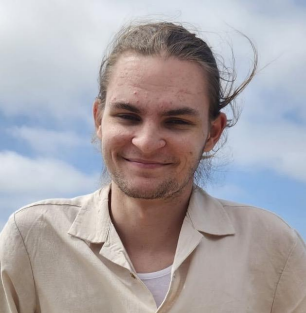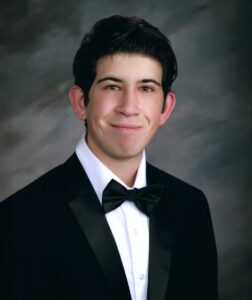By Jonas Mufson
Cadmus took two steady, even breaths before opening the apartment door. He stepped into a sparsely decorated living room, weaving around a pile of cardboard boxes and coming face to face with his mother, who looked up from a half chopped bell pepper.
“How was school today, Cadmus?”
In the past, Cadmus had called the rigid, emotionless expression his mother was wearing now her ‘court face’. All that was missing was a pair of non-prescription glasses, to show the jury that unlike some other lawyers, she didn’t need to read her speeches off of an augment. Cadmus’s hands curled into fists behind the counter, where his mother wouldn’t be able to see them.
“You didn’t bother to ask me on the first day of classes, so I think you must already know it didn’t go great, Leticia.”
His mom’s mouth curled faintly into a frown. Her mask always slipped when Cadmus called her by her first name.
“I just want to check in, Caddy. Lyla called me, you know. She told me that Hector is being nasty to you again.”
Cadmus’s face reddened.
“After what happened last time,” Leticia continued, “I don’t want you to let it get to you. You won’t be able to get into a top school with an incident like that in your senior year.” Cadmus blinked his glistening eyes a few times and shook his head.
“Jesus mom, you know I couldn’t punch him in his smug face again even if I wanted to. And besides, it’s not like he’s going around saying anything about dad this time. He’s just telling people about what good friends we used to be back in the Granite Seagull days. I don’t give two shits about that pathetic little snake anyway.”
“You can’t swear if you want people to take you seriously, Cadmus.”
Cadmus opened his mouth, closed it again, then stomped past the kitchen and into his bedroom, slamming the door behind him.
He emerged from the room again in the dead of night. His eyes were bloodshot, and the skin beneath them had developed a baggy gray hue. The oven clock showed that it was two in the morning. Cadmus paced from one side of the living room to the other, breathing unevenly and occasionally stopping to mime punching at a wall or tabletop. His eyes wandered over to the pile of moving boxes next to the couch. He walked across the room to them and began rummaging through a box near the top of the pile labeled ‘attic’. After a few moments he produced a thin, clear keycard.
Cadmus skipped school the next day. He found himself just outside the neighborhood that he used to live in, approaching an abandoned building. He held the keycard up to a locked door, which swung open as easily as it had on the day that Lyla first programmed the card to match the lock.
“Your garage is all well and good for playing,” she’d said. “But you and Hector need somewhere you can go that’s quiet to write lyrics.”
Cadmus walked past the pile of chairs that had been left next to the wall, past the old vent cover that he used to hide his half written lyrics in to make sure no one saw them, past the spot where Lyla had taught him how to send their Battle of the Bands flyer to every augment on the school’s network. He stopped next to an old-fashioned tower style computer whose plastic casing had cracked. He flipped it over and unscrewed the computer’s back cover, revealing a hollow cavity full of handwritten papers. He took the first paper off of the top- it was the only one that hadn’t yellowed with age. Cadmus’s eyes scanned the paper for a moment without really reading it, and he set it aside. Cadmus pulled the next paper out, and smiled slightly as he read it.
Lyla,
Part of me hopes you find this one day. If you ever do, I’m so, so sorry. I see the way you look at Cad, and he doesn’t look at you the same way. He told me that there isn’t anything between you two, and I don’t know what to believe, but I know that if you ever look my way with those eyes, you’ll see mine burning back at you just as brightly. These are the songs that I will never sing, but that I couldn’t keep in my heart.
Yours,
Hector
Somewhere far away, a computer screen lit up with an error message.
* * *
It wasn’t unusual for Cadmus to find himself in the school counselor’s office, but less than a week into the year was a new record. The new counselor wasn’t done unpacking yet, and several cardboard boxes were stacked in a neat pile in the corner. Besides a few plastic fidget toys littering her desk, there were no personal touches except for a neat nameplate declaring the counselor to be one Dr. Arcetia.
“Thank you for coming to see me, Cadmus.”
Dr. Arcetia smiled casually, wrinkling her eyes behind a pair of glasses. They were similar to the ones Cadmus’s mother wore, but their red tinted frames were even more outdated. “You don’t need to thank me,” he said.
The counselor’s smile tightened across her face for a second, then shifted into a sly grin. “I know that Vice Principal Fregan told you that you had no choice but to come see me, but I do appreciate you coming in nevertheless. Sometimes we adults forget that you teens are masters of your own bodies. But, since you’re here and I don’t want to waste our time, why don’t you take a seat and tell me about Hector?”
Cadmus spent five seconds grimacing before he obeyed.
“I’m not sure I’m allowed to use the words that would properly describe him.” Dr. Arcetia shrugged and raised her eyebrows, as if challenging him to say something so obscene that she would be forced to kick him out.
“Well, he’s a grade A piece of shit. A top shelf asshole. I’ve never met a slimier, pettier, more conniving snake in my life.”
“I see. Is that why your file says you two got into a physical altercation last year?” Cadmus looked at the floor, away from the counselor’s inquiring eyes.
“You could say that.”
“Well Cadmus, I want to know what you would say about it.”
Cadmus’s breathing started to become heavier, a hint of red appearing on his cheeks. “I’d say I didn’t care if that little worm wanted to spread all sorts of dumbass rumors about me. But then he went after my dad, and that crossed a line. I was so sick of his bullshit, literally sick. I couldn’t sleep, and I felt like I had a fever. Somehow, I had to get it out of me.”
Cadmus paused for a moment. He searched Dr. Arcetia’s eyes for signs of disgust or fear, but she just stared at him vaguely, like a scientist observing a rat perform a trick. “Well, I got the jump on him. Knocked him over before he could fight back, and started kicking the shit out of him. Almost got expelled over it too, but my mom threatened to sue the school because they hadn’t done anything about Hector’s harassment campaign. So, they suspended us both for a month and called it a wash. Hector never talked shit about me after that, at least not where I could hear him.”
“Until the school year started this year, you mean.”
Cadmus shifted to the back of his chair, looking away from Dr. Arcetia’s suddenly incisive gaze.
“Well, he knew I couldn’t fight back anymore.”
“And why couldn’t you fight back?”
The red in Cadmus’s cheeks had become a deep cherry color.
“You know why.”
“How can you be sure?” Dr. Arcetia said.
“Holy shit, even if they didn’t make you check my file, they must have warned you about me.”
“I want to hear you say it.”
Cadmus raised his head to look back into the counselor’s eyes. They’d returned to their soft, curious expression. She met his furious gaze unblinkingly, and silence thickened in the air between them.
“I can’t fight back anymore because I’m dead.” Dr. Arcetia did not seem surprised by this outburst. Instead, she gave him a slight nod of approval.
“I suppose that’s one way to put it.”
“It’s the only way to put it. I’m Cadmus Deon. Two months ago, Cadmus Deon was hit by a train and died. Therefore, I am a dead man.”
“Some Mimeos prefer to think of themselves as having a second chance at life. How would your mother feel if she heard you talking about yourself that way?” Cadmus looked away from the counselor again, this time at the boxes in the corner. One of them had a rolled up poster sticking out of the top.
“I thought you said you weren’t going to waste our time.”
“I don’t think it’s a waste of time to discuss your home life. Your mother made some big sacrifices for this version of you. I’m sure that makes your relationship complicated.” Cadmus noticed a spider spinning a web between the topmost box and the wall. “If you don’t want to talk about it, that’s okay. It seems as though you found another way to get back at Hector, though. You managed to show the whole school his darkest secret. How long have you been holding onto those old love songs?”
Cadmus hesitated for a moment. His mother would not approve of him confessing directly to breaking the law. But Dr. Arcetia didn’t seem to mind. She was observing Cadmus intently, her eyes flitting from his face to his fidgeting hands, which were flexing arrhytmically, almost as though they were pressing up on a wall only he could feel. After a few moments of careful observation, she looked back into Cadmus’s eyes.
“I didn’t. I went to this old place where we used to hide our half finished songs and checked the spot Hector thought I didn’t know about. There was some other stuff in there, but it was mostly the old love songs.”
“What do you mean, there was some other stuff in there?”
The counselor had leaned forward quite suddenly, and her eyes- despite her glasses almost sliding off of her nose- stared intently at Cadmus, like a hawk looking at a suspiciously shaking blade of grass. Cadmus’s mouth hung open slightly.
“I don’t know- there was just something else there, some stupid letter. I don’t even remember what it said. The point is that I had a way to get even with Hector.” The counselor leaned back in her chair and straightened her glasses.
“So, did it work? Do you feel better now that you’ve gotten back at him?” Cadmus grimaced and attempted to observe Dr. Arcetia’s features the same way she’d observed his. She was tapping one finger soundlessly on the blank piece of paper in front of her. “No, it didn’t work.”
Cadmus’s voice cracked.
“Lyla cornered me right away. She kept wiping tears out of her eyes. She told me that I’d embarrassed her by bringing her into my ‘petty little fight’ with Hector, and that there must be something wrong with my- with my programming, because… because the real Cadmus would have never done something that was so hurtful to her.”
“Do you think that she was right? Do you feel like there is something wrong with your programming?”
The calm tone with which Dr. Arcetia asked the question was impressive. She might as well have been asking if he thought there was something wrong with the school lunch, she sounded so matter-of-fact. It took Cadmus a few moments to figure out how to respond.
“I don’t know how I’m supposed to know that. I thought I knew who Hector was, and I was wrong. Really wrong. So, yeah, maybe there’s something wrong with my- with me. But maybe Lyla just thought she knew me better than she did.”
The counselor nodded approvingly.
“That’s a great answer, Cadmus. It shows a level of self-awareness that’s rare for boys your age.”
Cadmus’s grimace shifted into an echo of a smile.
“When we go through traumatic events,” the Counselor continued, “and make no mistake, you have gone through a traumatic event, we have a tendency to try and block it out. To move on and pretend it is not affecting us. I think that before we can figure out how to navigate everything that happened this week, we need to address the transformation you’ve undergone directly.”
Cadmus shifted towards the back of the seat, but didn’t break eye contact with Dr. Arcetia.
“I mean, that sounds like a good idea when you say it like that, but how is that even supposed to work? How am I supposed to address- to address that?”
Dr. Arcetia cocked her head to the side and thought for a moment.
“I’m not totally sure, to be honest. I think a good place to start might be a guided meditation on the subject. Would you be comfortable with me guiding you through something like that?”
Cadmus’s position in the chair looked anything but comfortable, but he nodded his head. The counselor smiled warmly and walked over to one of the boxes in the corner. She gingerly lifted a black metal bowl resting on a cushion out of the box and set it on her desk. “Do you know what this is, Cadmus?”
He nodded.
“It’s a singing bowl, right? I’ve heard of them, but they aren’t exactly a great match for a punk band.”
“That’s right- I suppose I shouldn’t be too surprised. The standing bell isn’t just used for music though- it can be used for religious ceremonies, and of course to help guide meditation.” Dr. Arcetia retrieved a cylindrical mallet covered in some sort of fabric from the box, and tapped the outer rim of the bowl. This produced a clear, reverberating note which hung in the air for a moment before the counselor began to trace the outer edge of the bowl with the mallet. As she traced the edge, the ringing of the bell became smooth. She hesitated for a moment every time she reached the far edge of the bowl, creating a consistent rhythm- deeper for a second, then lighter for a few seconds, and then deeper again.
“Are you ready to begin?”
“I am.”
“Excellent. To start, take a deep breath in through your nose, and then release it gently. Try to match the rhythm of the bell. That’s good. Now, close your eyes and focus only on your breathing. Breathing is the most essential, constant function of our bodies. Focussing on our breath allows us to begin to access the parts of our mind that run without conscious thought. As I lead you through the meditation, make sure you are concentrated primarily on the rhythm of your breathing… allow my voice to be like a gentle thought in the back of your mind, guiding you without demanding your attention. You’re doing an amazing job so far.
Now, keeping your eyes closed, imagine you are floating just beneath the surface of the ocean. Its water is cool and relaxing on your skin. It is calm and still under the ocean, and above you, you can see the sunlight dancing across the surface of the water. As you release your breath, you sink slowly downward. The surface slips farther and farther away from you, until there is no light at all. Then, you notice a different sort of light beneath you- the orange glow of a volcanic vent on the seafloor. As you sink towards it, you realize that you are in an ancient sea, the primordial sea where strands of RNA formed the very first life forms on Earth, around vents just like these. Your feet brush up on the silty surface of the ocean floor, and you stop sinking as you breathe out. Instead, you notice something rather unusual next to your feet- a large metal tube, a little bit wider than your own body.
As you release your breath, you follow the cable along the ocean floor. It is humming slightly. You see a third kind of light in the distance, not the light of the seafloor vent or the sun, but bright, steady, artificial light. The cable runs through the side of a glass dome that has been constructed here at the bottom of the ocean. Bright spotlights within the dome illuminate the walls of an underwater factory. Here, an entirely new form of life is being created, one based on silicone rather than carbon.”
Cadmus was sweating. His hands were gripping the arms of the chair so tightly that they started to crack. He tried to unclench them, but his hands didn’t seem to receive the message. Instead, he continued to slowly breathe in and out in time with the singing bowl.
“As you breathe out, you pass through the dome. You can see several other cables, just like the one you followed here, running underneath other parts of the dome and into the facility.
As you take another breath, you follow your cable through the wall, into a room full of whirring machinery, conveyor belts, and furnaces. As you breathe out, you follow the cable through the inner wall and into a room lined with large, cylindrical tanks filled with various liquids- some are clear, some are yellow or pale green, but most are red. Another breath, and you enter the central room of the factory, where those cables converge into its beating, metal heart.
The cables are carrying information in them- information about thousands of people. A few moments ago, your mother signed over your legal right to anonymity to Delphi Analytics, and now every augment that has ever come into contact with your biosignature- your friends’, your family’s, total strangers’, even the toy phone you had as baby- are sending every action they recorded you taking here. Your response to stimuli- the words you said, the actions you took, your temperature, your heart rate- this information is being processed and translated by the central computer into the language of the Human Facsimile Model, into parameters and variables and classification clusters.”
Cadmus breathed deeply, in and then out. He did not open his eyes. He did not stand up and run out of the room. He did not open his mouth to scream.
“In this central room, there are terminals accessible to human data engineers to make sure there’s no issue with the final product. Right now, I am sitting at one of those terminals. I am reviewing your code. I am typing a line of code into the terminal- once I say ‘enter’, your programming will be updated. The statement reads ‘return variables (admin_key, central_production_gps_coordinates, cardinal_parameter_value);’. Now… enter. ”
Cadmus opened his mouth, but did not speak. He closed it again and saw that a blank piece of paper and a pen were now sitting before him. He picked up the pen and began to write furiously without looking at the paper. After a minute of writing, Cadmus let out a sharp sigh and dropped the pen, slumping over in his seat. The jumble of letters, numbers, and symbols made no sense to Cadmus, but the counselor’s eyes shone with unconcealed excitement as they roamed the paper. After a moment, she tapped the side of her glasses frame, which emitted a flash of light, and then grabbed the pen and clicked it closed. The ink on the page immediately began to dissolve into a sort of smoke, and after a few seconds the page was blank once again. The counselor turned her attention back to Cadmus, whose glassy eyes were fixed on her. “I knew you could do it, Cadmus. Thank you, truly. I’m in your debt.”
Dr. Arcetia grabbed the standing bell and put it back in the box, which she picked up. “Wait.”
Cadmus’s voice was low and hoarse.
“If you’re in my debt, then tell me something.”
She set the box down on the desk.
“Of course. If it’s within my power to answer, then I will.”
“What happens to me now that you’ve done this?”
The woman frowned and looked over Cadmus’s damp face. She reached up to press on the side of her glasses frame again. “Admin key,” she said, and the frame let out a series of high pitched tones. “There, now you can be honest with me. I can give you an answer, but first I want to ask a question. The note that you hid on top of Hector’s love letter, the one you didn’t want to talk about earlier- you know what it was?”
Cadmus swallowed hard and nodded his head.
“Alright then. In a few days, Delphi will realize that I’ve been sending them procedurally generated data from your feed. They’ll deactivate you remotely, and then pick up your body to see if they can use your physical records to determine my identity. They’ll fail of course, not that you care. Delphi will want to draw as little attention as possible to this incident. They’ll claim it was a manufacturing defect and provide a new Mimeo to your mother free of charge, without any recollection of the last two months. From there, I imagine they’ll recycle you for parts, but they may opt simply to incinerate you if they’re worried about a trojan horse.” Cadmus’s face betrayed no emotion.
“Your mom will get what she wants, and the new version of you won’t know the real reason you died. And you get what you wanted too, now that you remember why you want it. Everybody wins.”
The woman was almost to the door when Cadmus found his voice.
“I don’t want to die anymore,” he said.
She stopped, but didn’t turn around.
“You… you made me give you all that information. You could help me. You could turn off my tracker, make it so they can’t deactivate me remotely.”
“They would still find you. Almost every human on the planet wears their eyes.” “But you said they wouldn’t find you, even though I saw your face. You could show me how. Please.”
The woman turned to face him.
“If I did, you would have to leave your life here behind. You wouldn’t ever be able to contact anyone you know ever again, or we would both be in danger. And if you disappear, your mother won’t be getting a replacement son, either. I know you don’t want to hurt her. That’s why you hid the note. That’s why you made your death look like an accident. You were willing to die for your mother before. Do you really think you’re ready to live for yourself now?”
A perfect imitation of a human being wouldn’t be complete without tear ducts. Cadmus was using his now.






